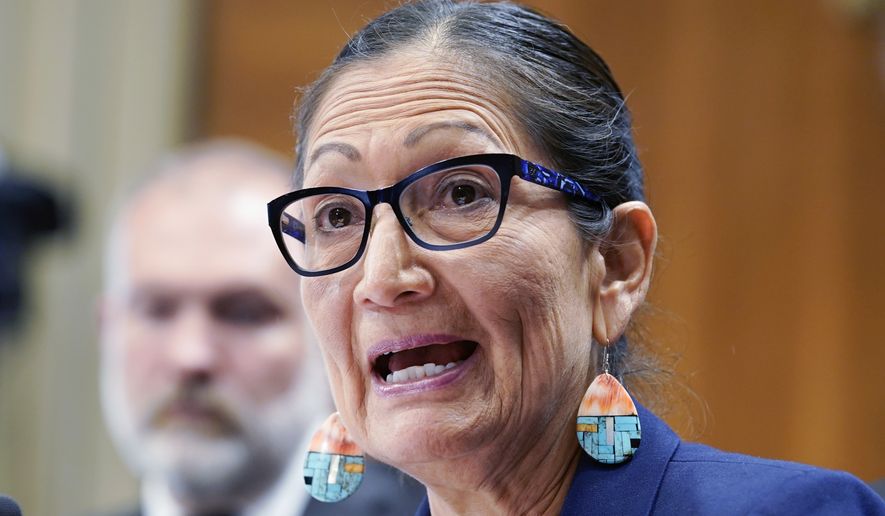A Republican lawmaker has joined a watchdog group in asking for ethics officials to look into how a Biden Cabinet member was able to report virtually no assets on a post-nomination financial-disclosure form despite years of drawing a six-figure congressional salary.
Rep. Bruce Westerman, Arkansas Republican, called Thursday for the Office of Inspector General to conduct an audit into the “efficacy and effectiveness” of the Interior Department’s Departmental Ethics Office, citing unanswered questions about Interior Secretary Deb Haaland’s financial disclosures.
Mr. Westerman, the ranking member on the House Natural Resources Committee, wrote a letter to Interior Inspector General Mark Greenblatt after the watchdog group Protect the Public’s Trust filed a July 20 complaint with the department over the Form 278e filed in December 2020 by Ms. Haaland.
“Last week, the completeness of Secretary Haaland’s disclosures were again called into question,” the Arkansas Republican said. “In addition to raising concerns about Secretary Haaland’s compliance with federal ethics standards, this complaint triggers additional questions about the operation of the Department of the Interior’s (DOI) Departmental Ethics Office (DEO).”
The disclosure form reported no assets over $5,000 from bank and investment accounts. The only asset listed was an annual per capita payment of $175 from her enrolled tribal membership in the Laguna of Pueblo.
She was not required to report federal income from her two years as a congresswoman from New Mexico, during which her annual salary was $174,000.
SEE ALSO: Biden’s Democrats told to listen to Obama’s warning not to raise taxes during a recession
Her disclosure form “indicated a net worth of $0,” said Protect the Public’s Trust.
“The American public grants incredible authority to Cabinet officials such as the Secretary of the Interior in return for full transparency,” said group director Michael Chamberlain. “It is extremely difficult to believe, in fact, strains credulity, that someone who had been making a congressional salary of $174,000 and was to be entrusted with overseeing a budget of more than $17 billion would not herself have a bank account.”
He continued: “Yet we are asked to believe precisely that, with no supporting evidence. Instead, Protect the Public’s Trust believes that an investigation to discover the truth is warranted.”
Mr. Westerman, who had asked the Office of Inspector General to conduct an audit in January, was also skeptical.
“Based on her prior employment as a member of the U.S. House of Representatives from which she received an annual salary of $174,000.00, the absence of a reportable bank account, while not impossible, appears improbable,” Mr. Westerman said in his letter.
The Washington Times has reached out to the Interior Department for comment.
SEE ALSO: Biden boasts ‘giant step forward’ for America from Democrats’ new tax-and-spend bill
Ms. Haaland updated her disclosure form after marrying in August 2021 longtime partner Skip Sayre, head of sales and marketing at Laguna Pueblo Development, the tribe’s economic development arm, according to Albuquerque’s The Paper.
“While her 2021 Form 278e indicated a net worth of $0, the financial disclosure Secretary Haaland submitted after marrying her long-time partner reported assets of between $970,000 and $2.125 million,” said Protect the Public’s Trust in a July 20 statement. “This range did not include two residences on which the couple has mortgages, one of which reportedly is a New Mexico home worth in excess of $1 million that has been her registered voting address for several years.”
The group said that the “absence of a bank account on her financial disclosure raises many questions.”
“What was happening to her paychecks?” asked the watchdog group. “Most employers, including federal employers, normally require direct deposit of employees’ wages. Did DOI ethics officials notice this anomaly and question the Secretary about it? If her paychecks were being deposited in another type of account, would that not require that account to be reported?”
Mr. Westerman asked in his letter how the DEO collects information from political appointees and whether the department has procedures in place to verify the information.
“This example is illustrative of larger questions regarding the processes in place at the DEO,” Mr. Westerman said.
• Valerie Richardson can be reached at vrichardson@washingtontimes.com.




Please read our comment policy before commenting.